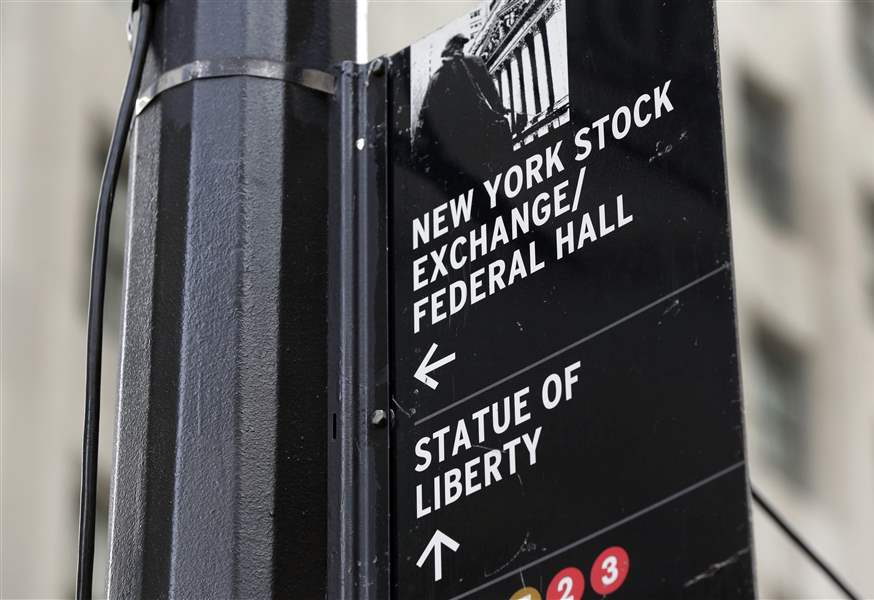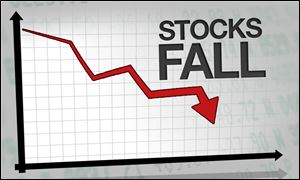
Health care companies, banks drive lower close for US stocks
12/14/2017
Gains by technology companies and banks helped lift U.S. stocks higher in early trading on Thursday.
ASSOCIATED PRESS
Health care companies and banks drove U.S. stocks lower Thursday, pulling major indexes below their recent highs.
The afternoon slide, which erased gains from earlier in the day, came on news that some Republican senators’ support for the GOP’s proposed tax overhaul bill was faltering.
Small-company stocks, which would be among the biggest beneficiaries of the bill’s reduction of corporate income tax rates, declined more than the rest of the market.

RELATED: Searchable stock index
“The market is focused almost completely on the corporate tax reduction,” said Quincy Krosby, chief market strategist at Prudential Financial. “And there are still concerns that some of the key Republican senators are wavering.”
The losses outweighed gains among retailers, which got a boost from a government report showing that retail sales jumped in November.
The Standard & Poor’s 500 index fell 10.84 points, or 0.4 percent, to 2,652.01. The Dow Jones industrial average lost 76.77 points, or 0.3 percent, to 24,508.66. The Nasdaq shed 19.27 points, or 0.3 percent, to 6,856.53. The Russell 2000 index of smaller-company stocks gave up 17.50 points, or 1.2 percent, to 1,506.95.
Despite the declines, the indexes are all on track to finish the week with a gain.
Republican Sen. Marco Rubio said Thursday he will vote against the proposed tax bill unless negotiators expand its child tax credit. The bill would increase the child tax credit to $2,000 from $1,000, but the Florida lawmaker wants more. Meanwhile, a spokesman for Republican Mike Lee said the senator is undecided on the bill.
House and Senate leaders agreed on the bill in principle on Wednesday, but were still finalizing the legislation, which they plan to unveil Friday and then move it through the Senate next week.
“With all eyes being on tax reform and getting really, really close to having it passed, now it comes down to the votes,” said Tom Martin senior portfolio manager at GLOBALT Investments.
The stock indexes had been moving higher earlier in the day after the Commerce Department said that sales at retailers and restaurants jumped 0.8 percent last month. Sales in a category that mostly includes online shopping leapt 2.5 percent, while sales at electronics stores rose 2.1 percent. Furniture store sales increased 1.2 percent.
The report helped lift several retailers. Tiffany & Co. gained $3.24, or 3.4 percent, to $99.34, while Mattel added 65 cents, or 4.2 percent, to $16.24.
Health care stocks accounted for much of the market’s losses. Medical care services company DaVita shed $2.27, or 3.2 percent, to $69.03.
Shares in several banks and other financial companies also declined. Navient fell 32 cents, or 2.5 percent, to $12.62.
Pier 1 Imports’ latest outlook put investors in a selling mood. The home decor company slumped 29.5 percent after it cut its forecasts and said its business has struggled in December. The stock slid $1.72 to $4.12.
Traders welcomed news that Disney agreed to buy a large part of the Murdoch family’s 21st Century Fox for about $52.4 billion in stock.
The deal includes film and television studios and cable and international TV businesses. The transaction also includes approximately $13.7 billion in debt. Robert Iger will continue as Disney’s chairman and CEO through the end of 2021. Disney added $2.96, or 2.8 percent, to $110.57. Fox was the biggest gainer in the S&P 500, climbing $2.13, or 6.5 percent, to $34.88.
Teva Pharmaceuticals was another big gainer. The Israeli drugmaker jumped 10.2 percent after it said that it would lay off 14,000 workers, or more than a quarter of its staff. The move is part of a global restructuring meant to salvage its ailing business. Teva’s shares picked up $1.60 to $17.30.
Bond prices were little changed. The yield on the 10-year Treasury held at 2.35 percent.
Oil prices rose, reversing an early slide. Benchmark U.S. crude added 44 cents to close at $57.04 a barrel on the New York Mercantile Exchange. Brent crude, used to price international oils, rose 86 cents, or 1.4 percent, to $63.30 per barrel in London.
The dollar fell to 112.18 yen from 112.52 yen on Wednesday. The euro weakened to $1.1792 from $1.1820.
Bitcoin futures declined on their fourth day of trading, dropping $255, or 1.5 percent, to $16,800 on the Cboe Futures Exchange. The futures allow investors to make bets on the future price of bitcoin. The average price of an actual bitcoin was $16,496 in trading on private exchanges, according to Coindesk. The price of the digital currency has soared this year, having begun 2017 under $1,000.
In other energy futures trading, wholesale gasoline added 2 cents, or 1.5 percent, to $1.67 a gallon. Heating oil rose a penny to $1.91 a gallon. Natural gas slipped 3 cents, or 1.1 percent, to $2.68 per 1,000 cubic feet.
Gold rose $8.50 to $1,257.10 an ounce. Silver gained 7 cents to $15.93 an ounce. Copper added 2 cents to $3.07 a pound.
Major stock indexes in Europe finished lower after the European Central Bank and the Bank of England opted to keep interest rates unchanged, as expected. Germany’s DAX fell 0.4 percent, while France’s CAC 40 lost 0.8 percent. Britain’s FTSE 100 shed 0.6 percent.
Earlier in Asia, Japan’s benchmark Nikkei 225 index fell 0.3 percent. South Korea’s Kospi gave up 0.5 percent, while Hong Kong’s Hang Seng slipped 0.2 percent. Australia’s S&P/ASX 200 lost 0.2 percent.